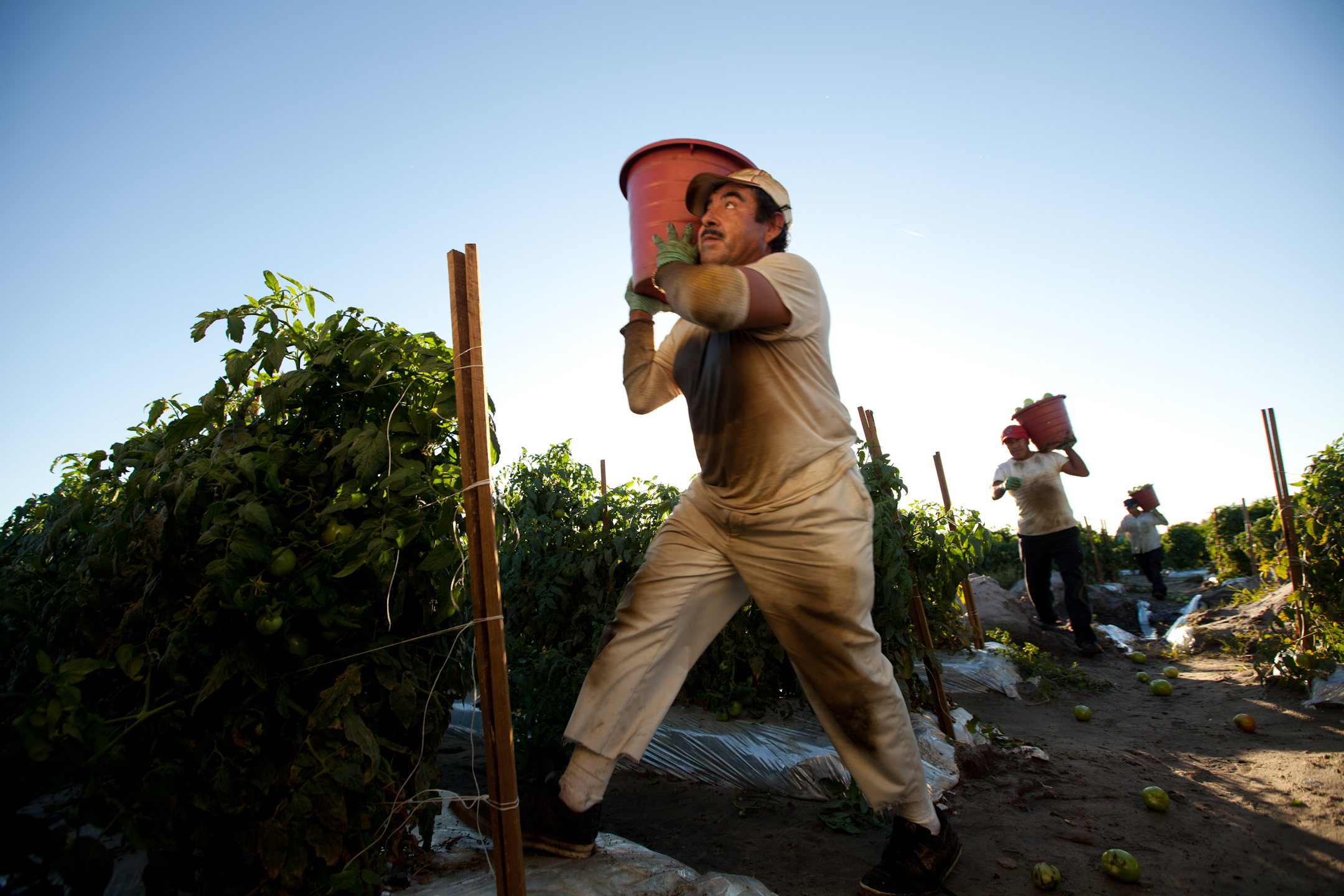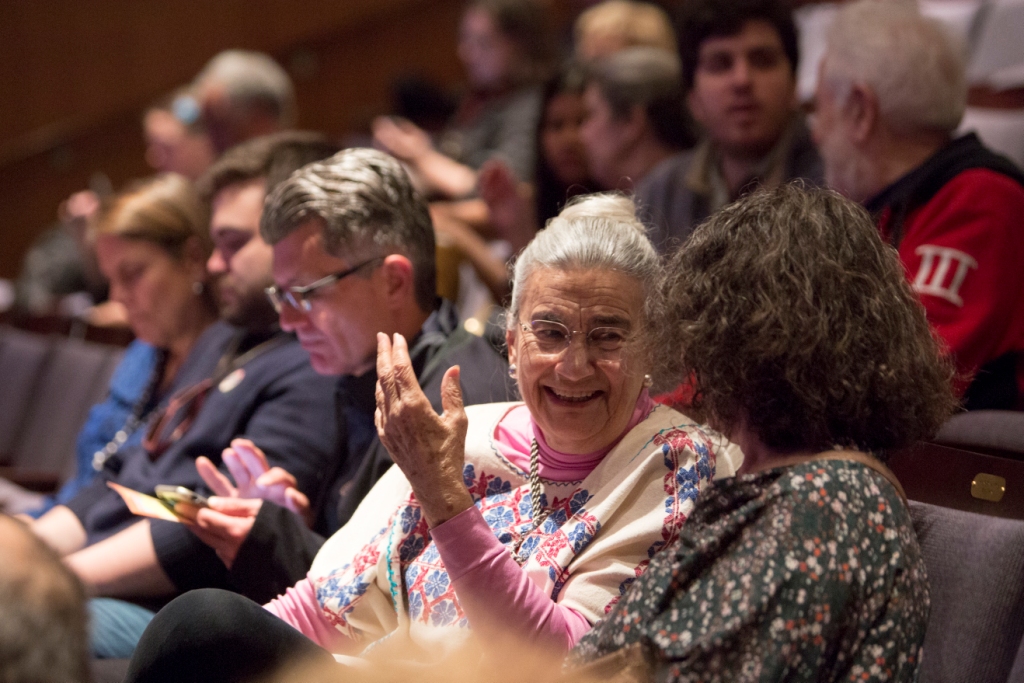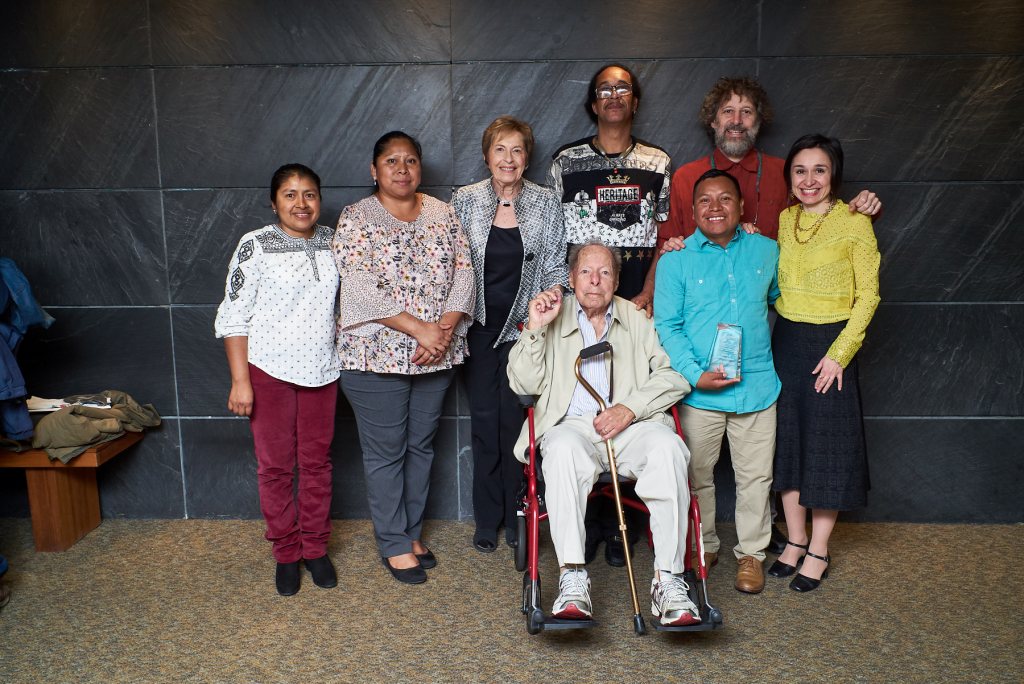How to Bring Corporations to Their Knees: 2018 ALBA/Puffin Award Honors Florida Farm Workers
How do you convince a multinational corporate buyer not only to pay a bit more, but to force its suppliers to respect human rights, help fight sexual and labor abuse, and give an autonomous voice to the workers they employ? Florida’s Coalition of Immokalee Workers (CIW) has cracked the code. The key, they found, is to work through consumers to hit the corporations where it hurts—their brand—and then have those corporations pressure the employers in their supply chain into compliance.
So far, the CIW has convinced fourteen large corporations—including Walmart, McDonald’s, Chipotle, Trader Joe’s, and Taco Bell—to only buy tomatoes from suppliers that adhere to the CIW’s code of conduct. They have also persuaded them to add an extra penny on the pound to improve farm workers’ paychecks.
Founded in 1993 in Immokalee, Florida, the CIW is a worker-based labor organization that has distinguished itself for its creative and tenacious tactics. It began by organizing protests against wage cuts and the use of violence by supervisors against field workers. In 2005—after numerous strikes, marches, a nationwide boycott of Taco Bell and a 30-day hunger strike—the CIW secured major wage increases and the implementation of the Fair Food Program (FFP), a strict code of conduct governing working conditions for farm workers.
On May 12, three representatives of the CIW traveled to New York City to accept the 2018 ALBA/Puffin Award for Human Rights Activism. The event program included speeches by ALBA’s Marina Garde, Fraser Ottanelli, and Sebastiaan Faber; the Puffin Foundation’s Neal Rosenstein; and farmworkers and CIW’s members and organizers Julia de la Cruz, Lupe Gonzalo, and Óscar Otzoy, who received a standing ovation. The event closed with a riveting musical performance of Bruce Barthol, Dred Scott, Kenny Kosek, Diego Voglino, Hillary Gardner, and Liberty Elman.
The award ceremony was preceded by an hour-long public interview with New York City-based political anchor and reporter Juan Manuel Benítez, De la Cruz, Gonzalo, and Otzoy explained how the CIW’s extensive programs help prevent and punish all forms of abuse on farms in Florida and a number of other states. Preceding the #MeToo Movement by several years, CIW has worked hard to curb the sexual harassment of female workers that was long common practice in the fields. “Before the Fair Food Program, there were no regulations, no protections, and no reporting mechanisms,” De la Cruz said. “Even if women dared to report abuse, those reports rarely went beyond the supervisors, or had to be made to the harassers themselves. As a result, women often stayed silent. Most cases were met with impunity.”
The Fair Food Program has helped institute a zero-tolerance policy for abuses of all kinds. Since its introduction and thanks to the CIW’s 24-hour reporting hotline, cases of abuse are processed swiftly and result in immediate consequences. “Since we introduced the program, two thousand complaints have been brought to a resolution,” said Gonzalo, “while 35 thousand workers have received training sessions.” The CIW’s programs and materials are made available in English, Spanish, and Creole.
Currently, more than 90 percent of Florida tomato farms operate under the FFP. Similar programs have been adopted in Georgia, Virginia, North and South Carolina, and New Jersey. Other crops and even dairy farms are increasingly included as well. “By applying pressure directly on the corporations, we are able to bypass legislatures,” said Marley Moynahan, a CIW staff member who helped translate for De la Cruz, Gonzalo, and Otzoy. “This explains the notable fact that a program like ours could emerge in Florida, whose political environment is fairly hostile to labor.”
“People still have rights in this country.”
While continuing to organize for fair wages and better working conditions, in the late 1990s the CIW turned its attention to a campaign to eliminate modern-day slavery in the agricultural industry: workers who are held against their will by violence or the threat of violence, including beatings, shootings, and pistol-whippings. Over the past two decades, the CIW’s Anti-Slavery Campaign has uncovered, investigated, and assisted in the prosecution of numerous multi-state farm slavery operations across the Southeastern U.S., helping to liberate over 1,200 workers held against their will. CIW also pioneered the worker-centered approach to slavery prosecution, playing a key role in the passage of the 2000 Trafficking Victims Protection Act, and advocating for solutions to prevent and end all forms of human trafficking and modern slavery around the world.
“Has the new administration in Washington D.C. posed new challenges for the CIW?” asked Benítez, the journalist. “In the beginning there was definitely a spike in fear among our workers,” said De la Cruz. “But people quickly came together as they recognized the need for unity. And because we work directly with the buyers, independent from any administration, the Fair Food Program continues to be enforced as usual. While the changed climate around immigration has caused a drop-off in immigrants’ reporting abuse to the police, it’s notable that the reporting rates in the Fair Food Program have not shifted.”
“Regardless of what’s said, people still have rights in this country,” Gonzalo added. “And the truth is that the people are gaining in strength. We now have the opportunity to come together and fight for our rights.”
One of the largest monetary awards for human rights in the world, the ALBA/Puffin Award for Human Rights Activism is a $100,000 cash prize granted annually by ALBA and the Puffin Foundation in honor of the 3,000 Americans who volunteered in the Spanish Civil War (1936-1939) to fight fascism under the banner of the Abraham Lincoln Brigade. The award was created by visionary and philanthropist Perry Rosenstein, President of the Puffin Foundation, which established an endowed fund for this human rights award in 2010.
















